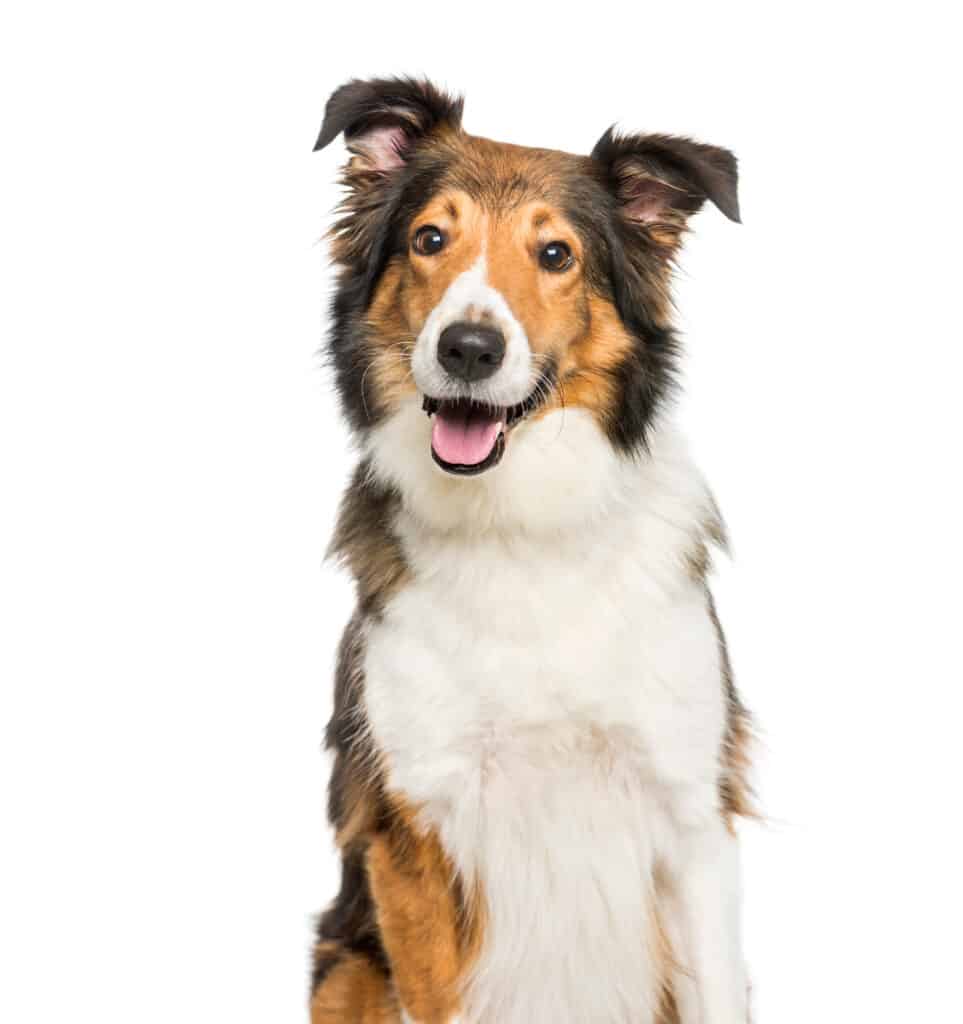Scotch Collie
Canis Lupus
Scotch collies are one of the oldest collie breeds and were eventually bred to create the more popular border collie!
Advertisement
Scotch Collie Scientific Classification
- Kingdom
- Animalia
- Phylum
- Chordata
- Class
- Mammalia
- Order
- Carnivora
- Family
- Canidae
- Genus
- Canis
- Scientific Name
- Canis Lupus
Read our Complete Guide to Classification of Animals.
Scotch Collie Conservation Status
Scotch Collie Facts
- Name Of Young
- puppy
- Group Behavior
- Pack
- Fun Fact
- Scotch collies are one of the oldest collie breeds and were eventually bred to create the more popular border collie!
- Most Distinctive Feature
- Teflon-like fur
- Other Name(s)
- Scotchie
- Gestation Period
- 9 weeks
- Temperament
- Social and intelligent
- Training
- Easy
- Litter Size
- 4-6
- Diet for this Fish
- Omnivore
- Lifestyle
- Social
- Favorite Food
- Dog food
- Common Name
- Scotch collie
- Origin
- Scotland
Scotch Collie as a Pet:
- General Health
- Energy Level
- Shedability
- Trainability
- Intelligence
- Tendency to Chew
- Size
- Family and kid friendliness
- Yappiness / Barking
- Low
- Separation Anxiety
- High
- Preferred Temperature
- Average climate
- Exercise Needs
- High
- Friendly With Other Dogs
- High
- Pure bred cost to own
- $1400
- Dog group
- Herding
- Male weight
- 45-70 lbs
- Female weight
- 40-57 lbs
This post may contain affiliate links to our partners like Chewy, Amazon, and others. Purchasing through these helps us further the A-Z Animals mission to educate about the world's species.
View all of the Scotch Collie images!
The Scotch collie is considered one of the best shepherd dogs of all time.
5 Scotch Collie Interesting Facts
- The famous Scotch collie, Shep, patiently waited for his deceased owner to return to the Montana train station for five and a half years.
- Queen Victoria, the second longest reigning monarch of the UK, was an avid fan of Scotch collies.
- Scotch collies came very close to becoming extinct during the 1990s, but a few dedicated breeders managed to raise their numbers again. They are no longer endangered.
- Their fur is often referred to as a “Teflon coat,” meaning that grass burs, mud, and other debris doesn’t stick to it.
- Scotchies are extremely sensitive to human emotion and often attempt to console their owner if they sense distress, fear, anxiety, etc.
Introduction
The Scotch collie is considered one of the best shepherd dogs of all time. Originally a herding dog, Scotch collies have been around since the early 1900s in Scotland and have been bred with numerous breeds of show dogs over the years. Despite its wonderfully friendly temperament, its numbers have been on the decline and came near extinction during the 1990s. Not only is a Scotch collie the perfect herding dog, but it is also receptive to kids and people of all age groups — even strangers.
Pros and Cons of Owning a Scotch Collie
| Pros! | Cons! |
| Ideal pets. Scotch collies are family-friendly, excellent with children, and often get emotionally attached to people of every age group. | Separation anxiety sufferers. Since Scotch collies often become very close to their owners in a short time, you might have a tough time leaving them alone at home. |
| Barely drool. If you do not like being drenched in slimy dog saliva, the Scotch collie is a suitable pet for you! | Allergies. If you have any allergies that come from animals, being around a Scotch collie will aggravate them much more than most dogs. |
| Keeping you safe. Coming from a herding background, Scotch collies often look out for their owners, making them remarkable watchdogs. | Need for regular brushing and grooming. Scotch collies must be brushed at least four times a week and taken outside daily so they can groom themselves. |
Scotch Collie Size and Weight
A Scotch collie can be considered a medium- to large-sized dog. The average male Scotch collie height is 21-24”, while the average female height is 19-22’’. An adult Scotch collie weighs about 40-70 lbs on average. The largest Scotch collie known thus far, living during the 1980s in Scotland, has had a height of 26” and a weight of 90 lbs.
| Height (Male) | 21 – 24” |
| Height (Female) | 19 – 22” |
| Weight (male) | 45 – 70 lbs |
| Weight (female) | 40 – 60 lbs |

Scotch collies have what is known as a Teflon coat, which means that mud, burs, and other debris doesn’t stick to it.
©Eric Isselee/Shutterstock.com
The Best Dog Food For Scotch Collies
Since Scotch collies were originally herding dogs that looked after sheep for their shepherds, their diet requires a good balance of calories and protein. An adult Scotch collie should be fed a diet consisting of at least 25% protein, 20% fat, and about 7500 kJ/lb. One dog food brand that meets these nutritional requirements and is vet-recommended is Adventures American Journey Chicken & Sweet Potato Recipe Grain-Free Dry Dog Food.
It must be noted that Scotch collies are very prone to bloating and obesity. Thus, their food should be given to them in small portions throughout the day, with exercise in between to improve digestion and metabolic activity.
- Includes deboned chicken for the protein your dog needs
- Features antioxidant-rich vegetables
- Grain-free
- Free from poultry by-product meals, corn, wheat, soy and artificial ingredients
Scotch Collie Common Health Issues
Scotch collies are one of the healthiest dog breeds with the lowest history of chronic ailments during their lifetime. However, they do have some common health issues that may occur. Hip dysplasia is the most common joint disease in medium/large-sized dogs that affects their hips and legs, restricting their movement. Then comes the Collie Eye Anomaly, a genetic eye disease that causes blurred vision and eye defects in older Scotchies. The most common ailments of Scotch collies are as follows:
- Hip Dysplasia
- Collie Eye Anomaly
- Multi-Drug Resistance Gene (MDR1) Sensitivity
- Skin lesions (Dermatomyotosis)
- Seizures or Epilepsy
Scotch Collie Temperament
Scotch collies have a very responsive and clever personality. They are incredibly loyal to their owners and sensitive to their emotions. Although their behavior may appear clingy, it usually stems from the shepherd-like traits that drive them to protect their owner. They have a curious, affectionate, playful, and athletic temperament. These traits make them friendly and adaptable around other dogs and humans. However, they might still struggle to bond with their non-canine friends (cats), which have very different personalities from them. Scotch collies are generally very docile and do not shy away from strangers.
How to Take Care of Scotch Collies
Scotch collies can generally be considered a low-maintenance pet. They do not suffer from chronic health issues very often. Like all other dog breeds, a Scotch collie puppy requires a nutrition-based, protein-rich diet when young. In addition, they need daily vigorous exercise throughout their lives to prevent them from becoming overweight. Overall, as long as you engage and socialize with your dog, you should not have to worry much.
Scotch Collie Maintenance and Grooming
A Scotch collie’s fur coat is made up of two layers with varying lengths: the outer and the undercoat. The outer coat is straight and Teflon-like while the inner coat is soft and velvety. The Teflon-like outer coat prevents mud, grass, or other objects from sticking to it. Thus, the outer coat of the Scotch collie is often easy to maintain. The inner coat needs to be brushed as often as four times a week with a pin brush to prevent the formation of tangled hairballs. It is best to use a sturdy comb to clean the outer coat. Scotch collies usually shed only as much as an average dog. However, it is recommended that their coat is not shaved unless absolutely necessary.
Scotch Collie Training
Scotch collies are very human-oriented dogs and people-pleasers. The more you bond with your Scotchie, the easier it will be to train it. Since the dog is smart, it probably will not take more than a few tries for them to learn a task. Nevertheless, their herding instincts might often come into play, resulting in them performing certain tasks they were never trained for. This goes to say that Scotch collies require a certain degree of independence regarding their basic obedience training. Overall, the most effective collie training techniques would be consistent positive reinforcement and your presence as a leader in their daily lives.
Scotch Collie Exercise
Since Scotch collies were originally bred for herding purposes, they require fairly high amounts of physical activity and exertion. You should spend at least an hour a day with the dog doing moderate to vigorous exercise. You can also play mentally stimulating games such as Frisbee, fetch, or flyball with your dog and take them out on a walk or a light jog at least once daily. Scotch collies often require a lot of open space to thrive. Thus, it is recommended that you only take up a Scotch collie if you have a physically active lifestyle and/or a large backyard.
Scotch Collie Puppies
Scotch collies usually have a litter size of 2-8 puppies, with an average of 5 puppies. Since this dog breed is very clever and friendly, you can start training them when they’re still puppies, at a puppy kindergarten, perhaps. You could also begin with basic obedience training through a few basic commands such as sit, stay, come, stop, wait, etc. A Scotch collie puppy must be fed high-quality large-breed puppy formula to provide all the necessary nutrients and avoid health problems. Also, it is recommended that you find a reputable breeder or vet to get your collie’s health checked regularly.
Scotch Collie and Children
Scotch collies are incredibly loyal and family-friendly pets. Although reserved with strangers, they are very playful with children, especially in open spaces such as a backyard or a lawn. They were originally bred as herding dogs, so they may exhibit a herding instinct towards kids if they don’t stay where the collie wants them to be. Thus, it’s best to monitor the interactions of a child and the dog, and instruct your kid never to disturb the dog when it’s asleep or eating.
Popular Names for Scotch Collies
- Archie
- Fraser
- Highlander
- Rob Roy
- Fiona
- Skye
Famous Scotch Collies
- Shep was a Scotch collie who waited for his dead owner at the train station every day for five and a half years. The local community has even erected a statue in Shep’s honor in Montana.
- Queen Victoria bred many Scotch collies during her 63-year reign.
Dogs Similar to Scotch Collies
The Scotch collie is a herding dog that has a some other popular relatives including the order collie, the English shepherd, and the Shetland sheepdog.
- Border collies are very intelligent dogs that are super popular for dog owners that want an energetic but trainable dog.
- English shepherds are extremely loyal herding dogs that make amazing guard animals. This breed will stay by their owners side at all costs.
- Shetlands sheepdogs are long-haired sheepdogs that are high-energy and extremely loyal. They bark more than most sheepdogs but are just as intelligent.
Similar Animals
View all 293 animals that start with SScotch Collie FAQs (Frequently Asked Questions)
How much does Scotch Collie cost to own?
Scotch collies cost between $800-$2,000, with an average cost of $1,400. The initial supplies of a Scotch collie cost between $450-$1,500, while the monthly supply cost is from $80 to $200.
Are Scotch collies good with kids?
A very friendly canine, Scotch collies make fantastic pets that not only play with children outdoors but are also protective of them in the same way that they used to be of their sheep herd.
How long do Scotch collies live?
14-16 years. However, some have lived as long as 20 years.
Which dog breeds did the Scotch collie originate from?
First found in the Scottish mountains, Scotch collies originated by cross-breeding Celtic dogs with Nordic herding Spitzes.
Why did Scotch collies almost become extinct?
Since Scotch collies were originally sheep-herding dogs, they did not fare quite well with the transition from the wild to becoming domestic pets.
Thank you for reading! Have some feedback for us? Contact the AZ Animals editorial team.
Sources
- Old Time Farm Shepherd, Available here: https://www.oldtimefarmshepherd.org/breed-information/scotch-collie/
- Dog Zone, Available here: https://www.dogzone.com/breeds/scotch-collie/
- Dog Breed, Available here: https://www.dogbreedinfo.com/scotchcollie.htm


















